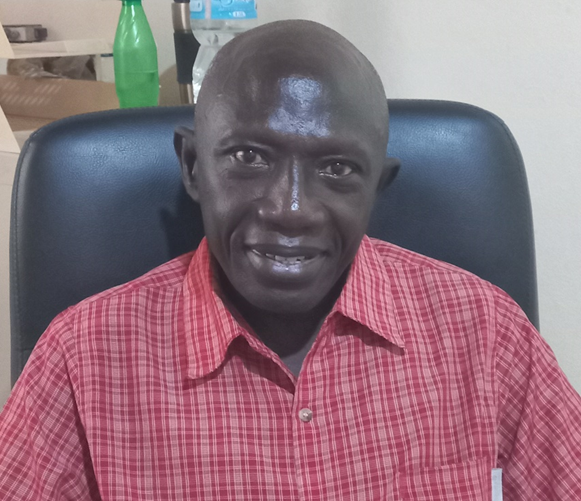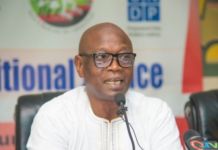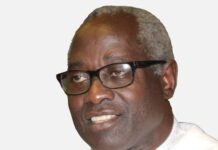By Dodou Loum, Executive Director of the Gambia Association for the Deaf and Hard of Hearing (GADHOH)
What really brings discrimination against deaf and hard-of-hearing people in our society is the failure of our duty bearers to embrace sign language for the fulfilment of the human rights of this disadvantaged community.
Despite its ratification of international human rights conventions, provisions in the 1997 Constitution and the Disabilities Act 2021, sectoral policies and development plans, the Gambia government has so far done very little to utilise sign language to uphold the human rights of our disadvantaged deaf community.
This is exactly the reason why the verse majority of the deaf and hard of hearing population continue to struggle without success in trying to access employment opportunities and essential public services.
The plight of Deaf people could be explained as follows:
There happened to be an emergency in which a section of society was drawn into a flood and struggling to get to the surface. Another section has succeeded in raising its head above water and can breathe air, while the remaining section has escaped from the water and is running to safety. The duty bearer came to address the desperate society, telling the section struggling under water. “Hey, you guys over there! Wait! We cannot pull you to the surface all at once! Because we also have to help those who are already out of the water, and we have very few resources for all this!”
Here, the deaf community is among those struggling underwater.
This is a blatant violation of Section 12 of the Persons with Disabilities (PWD) Act 2021. Trampling of the human rights of the Deaf and Hard of Hearing community must not continue. This is the biggest form of discrimination by our own authorities.
One human right denial, as you can see, leads to another. Failure to uphold sign language rights leads to the violation of many more rights of the deaf and hard-of-hearing community. Even at busy road intersections like Westfield’s, Deaf people struggling to board transport could not tell which direction passenger vans are heading. Right to medical care and even political participation are cases in point.
Since the early 2000s, GADHOH has trained more than 20 sign language interpreters who would have gone very far in satisfying the need for interpreter services in the Gambia. To our disappointment, a good number of them absconded during our international trips. Many of those who remain abandoned the work for employment opportunities elsewhere. There is currently a high demand for quality interpreter services as more deaf people strive to access employment opportunities and available public services.
Eight people are currently rendering interpreter services. Four of them are professional teachers employed at schools for the Deaf. Two of the remaining four are being employed full-time at institutions of Higher education, and are interpreter trainees. The remaining two are acting as freelance interpreters, taking contracts here and there according to their wishes and the attractiveness of the reward.
What is more heart-wrenching is the fact that all those who carry out interpreter services are based in the Banjul area.
The lack of interpreter service or poor quality interpreting is a great setback as it creates communication bottlenecks, misunderstandings, frustrations, embarrassments and confusion as deaf people interact with non-signers for various reasons.
Another setback for deaf people is the apparent inadequacy of education facilities, the most important of which are schools for the deaf or special classrooms attached to mainstream schools in needed locations, as well as sign language fluent teachers. Even though the deaf community has proved beyond all doubt that through sign language, Deaf people are competitive and capable of attaining any level of education, these essential facilities continue to be lacking. Some of the needy locations are: Kerewan, Farafenni, Bwiam, Albreda, Soma, Brikamaba, Bansang, Tanji and Kaur.
One thing being much talked about is the initiative of inserting sign language training in the Teacher Training Curriculum. It looks like a good idea, but could this create the students’ fluency in sign language, considering the limited time available? Teachers who cannot interact adequately in sign language using the deaf culture will only compromise the education of the deaf children.
Way forward
To improve the welfare of the deaf and hard-of-hearing community in The Gambia, GADHOH recommended the following:
· To start with, our authorities need to order the service of a sign language linguist who would work with GADHOH and other stakeholders to build on the work done so far, and support arranging the grammar of the Gambian sign language, as well as create a Digital Dictionary and final curriculum materials on the language.
· The Early Childhood and Inclusive Education Directorate in the Ministry of Basic and Secondary Education, in collaboration with GADHOH, have just started an initial work on this. However, the work could not continue due to the lack of expert service and financial support. A sustainable development strategy is the government supporting GADHOH with financial and material resources to resume the general sign language and awareness training for deaf people in the upcountry, a program which GADHOH started in 2012, but had to stop four years later due to a lack of funding.
· This community training will make the work of Polyvalent Itinerant teachers effective as they can communicate with deaf children who have already learned to communicate in the sign language.
· An intensive formal Sign language training program for all teachers of deaf students needs to be established and intensified by the Ministry of Basic and Secondary Education in collaboration with GADHOH.
· Intensive formal sign language training program for people aspiring to become sign language interpreters at their various places of work, such as Hospitals, Institutes of higher education, Vocational and Technical training centres. Need to be established and intensified by the relevant government agencies in collaboration with GADHOH.
· It is a more sustainable employment for relevant stakeholders to nominate an employee or employees for training to become sign language interpreters at their respective places of work than to recruit unemployed persons who always tend to switch to better-paying employment, or abscond while interpreting for deaf persons at international conferences.
· In our situation, teachers for schools for the Deaf who are not fluent in, or have no knowledge of, Gambian sign language at all, need to undergo an intensive sign language training after graduation from the College / University and should be released to the classroom only after their performances prove satisfactory.
· Service providers who engage sign language interpreters to make their services accessible to deaf people need to be mindful that only those Deaf and hard-of-hearing people who understand the Gambian sign language can benefit from such interpreter service.



















